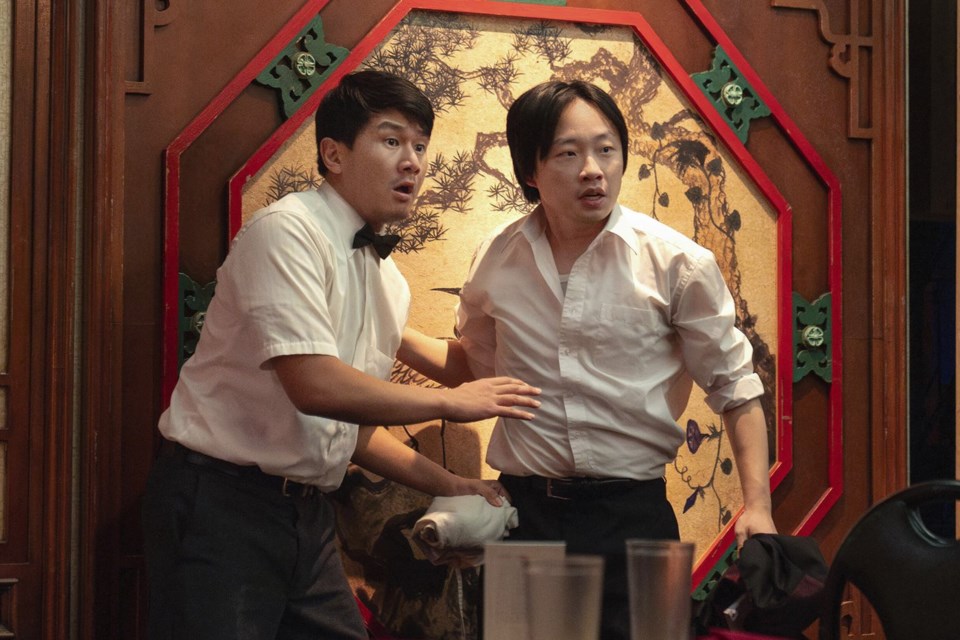once played âChinese Teenager #1.â He's now No. 1 on the call sheet in âInterior Chinatownâ â despite playing downtrodden background actor Willis Wu in the new Hulu series.
Thereâs no escaping the layers of meta around âInterior Chinatown,â an adaptation of that jabs at how Asian American men have been treated by Hollywood â and in life â one trope at a time.
âI feel like I have gone through every single number on the call sheet now,â Yang told The Associated Press. âAnd Iâve learned from a lot of other great No. 1s, you know? To carry yourself a certain way. Itâs not just about showing up when you work, but itâs also about leading by example.â
The is told from the view of Willis, a Chinatown restaurant server stuck in a police procedural show whose perspective starts to shift as he looks into the yearslong disappearance of his older brother. The 10-episode season has a mostly Asian cast including Ronny Chieng, Chloe Bennet, Archie Kao and Tzi Ma. There is also plenty of Asian talent behind the scenes, led by Yu, who serves as creator and executive producer.
The episodes are full of nods to cop dramas such as They also evoke scenes from '80s and '90s U.S. action-comedies structured around one of the co-leads being Asian and knowing martial arts â think âRush Hourâ and âMartial Law.â But it wasn't a youth spent watching these movies and shows that inspired Yu's book, which is structured like a screenplay.
âMore what informed the book was the experiences of my parents, who are immigrants, and of their community and seeing how they and their friends had built lives here, were trying to be Americans, were succeeding at it in a lot of ways, but still were feeling like outsiders â and wanting to just tell their story,â Yu said.
Taika Waititi, the and two and the first person of MÄori descent to win an Academy Award, also produces. He's no stranger to promoting underrepresented voices on television, co-creating the Emmy-nominated the first series where every role on and off-screen was held by someone Indigenous. Growing up in New Zealand, he saw similarities in âInterior Chinatownâ with how Indigenous MÄori like him were treated even in daily interactions.
âI remember working in a convenience store and I was always out the back of the convenience store. There were people who got to come in â and Iâd been working there for six months â and they went straight to work on the till,â Waititi told The Associated Press. âOne of the big draws to me was to be able to be involved in something that highlights those issues.â
The series' episode titles reference different archetypes that have shadowed Asian American actors for decades. These include âdelivery guy,â âtech guy,â âkung fu guyâ and âChinatown expert.â There has been Marvelâs âShang-Chi,â the CWâs âKung Fu,â and âWarriorâ on Max all have protagonists with martial arts prowess who also deal with personal baggage. All three stories happen to take place in
The show's commentary on stereotyping seems more relevant in a post-coronavirus pandemic era, Ma said.
âIn every major city, you know, the Chinatowns are going through hard times particularly after the pandemic,â Ma said. âI hope that people who come to Chinatown realize that Chinatown isn't just a place for you to eat food. Itâs a community.â
Chieng, who plays curmudgeonly restaurant server Fatty Choi, memorably stuck up for Chinatowns everywhere in 2016 when he used his âDaily Showâ gig to put Fox Newsâ Jesse Watters on blast for a racist segment about Manhattanâs Chinatown. (The Malaysian-born comedian says that takedown helped get him his part in alongside Yang. Unlike the characters in âInterior Chinatown,â he says, he has since been very fortunate. In fact, he didnât even have to read for Yu and other producers.)
A third of âInterior Chinatown'sâ main cast has been in projects set in a Chinatown, which Yu says affirms the story's examination of how Hollywood limits the range of roles available to Asian Americans.
âYou donât have to look too far down the IMDb listings of some of our cast who are really successful actors, but a few years ago could have easily been â you know, Jimmy likes to still tell the story of how he was âChinese Teenager (#1)â on Chloeâs show, âAgents of S.H.I.E.L.D.,â which is 10 years ago,â Yu said.
has spoken out before about struggling to be considered for roles when she used her actual surname, Wang. For so long, Bennet felt like her whiteness was what people saw at work and her ââAsian-nessâ was always reserved for home,â the former star told the AP. So, just walking onto the âInterior Chinatownâ set was emotional.
âIâm viewed as white and so Iâve never really been a part of something where being Asian was so much at the forefront on and off-screen,â Bennet said. âAnd so being surrounded by our incredible crew, who was also very diverse, was something I didnât realize Iâd seen and that it was the immediate power of representation. I felt so much more comfortable.â
Yang, though, was too embarrassed to tell his frequent scene partner about his nameless part on her show.
âThe journey that Willis was going through was the journey that I went through. I just have to zoom back 10 years,â said âI had a phase where I was fighting for the same kind of roles. ... Even I had to fight to get Chinese Teenager #1.â
Terry Tang, The Associated Press


